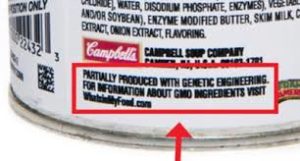26
Jul
Campbell’s Soup Parts with Grocery Manufacturers Association over GE Labeling
(Beyond Pesticides, July 26, 2017) Campbell Soup Co. announced that it will leave the Grocery Manufacturers Association (GMA) by the end of the year over concerns that the trade association no longer represents its views  concerning labeling of genetically engineered (GE) food. Campbell’s President and CEO Denise Morrison said that while the company does not question the safety of GE food, it recognizes that most consumers want to see GE ingredients on the label. Meanwhile, Campbell’s has supported the GMA digital disclosure and lists ingredients that “may be derived from crops grown from genetically engineered seeds” on its website.
concerning labeling of genetically engineered (GE) food. Campbell’s President and CEO Denise Morrison said that while the company does not question the safety of GE food, it recognizes that most consumers want to see GE ingredients on the label. Meanwhile, Campbell’s has supported the GMA digital disclosure and lists ingredients that “may be derived from crops grown from genetically engineered seeds” on its website.
The move by Campbell Soup comes as USDA is pondering possible disclosure options under the “compromise” bill on labeling genetically engineered food passed last year by the U.S. Congress. The company says, “While this legislation offers a range of disclosure options for manufacturers, we will introduce an on-pack statement as we know that’s what the overwhelming majority of Americans support. We’re working on language that provides specific ingredient information and supports the science that GMOs are safe.” A number of other companies have also announced their intention to label GE ingredients, while similarly maintaining their safety.
USDA’s Agricultural Marketing Service (AMS) has extended to August 25 the comment period for responding to 30 questions regarding the implementation of the law. The law includes labeling options other than on-package labeling, such as QR codes and websites, which would only serve to hide the information this law was passed to provide. It also allows USDA to decide which GE ingredients must be disclosed. Commenting provides a chance to help shape USDA’s proposal. So far, more than 3100 people have sent comments to AMS in response to a Beyond Pesticides alert.
Beyond Pesticides is telling USDA the following:
- The definition of “bioengineering” must include all forms of genetic engineering including newer forms like CRISPR and RNA interference (RNAi). Definitions should be compatible with those recommended by the National Organic Standards Board.
- Each GE ingredient must be identified, including highly refined GE sugars and oils and processed corn and soy ingredients. Even if they are so highly processed that the GE ingredients are present only at undetectable levels in the final product, they are still GE foods.
- GE ingredients must be identified on product labels, or product shelves in the case of raw foods. All products required to have labels should included identification of GE ingredients on the label.
- There must be no delays in making regulations effective. Manufacturers have already had years’ worth of notice and preparation to provide this information, at the state and federal level. Indeed, many major food companies have been labeling for some time.
Send your comments to AMS in support of your right to know now! Deadline extended until August 25, 2017.
USDA regulations will determine whether genetically engineered (GE) ingredients are identified on product labels, or hidden behind high-tech codes. Genetically engineered foods pose risks that are not considered by regulators. Consumers have a right to know whether the products they buy contain GE ingredients. This information should be on the product label.
Send your comments to AMS in support of your right to know now!
Genetically engineered foods pose risks that are not considered by regulators. The most dependable way to avoid GE ingredients is to buy organic, but all consumers have a right to know what is in their food.
All unattributed positions and opinions in this piece are those of Beyond Pesticides.
Sources: Food Business News










